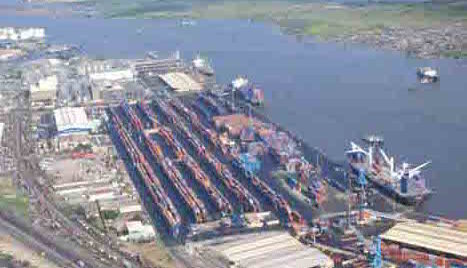
Esther Oritse
Lagos — The Nigerian Maritime Administration and Safety Agency (NIMASA) and the Port Facility Security Officers Forum of Nigeria (PFSOFN) are in discussions to develop a National Maritime Security Strategy aimed at enhancing the security of the nation’s ports.
Speaking at the end of a one day Maritime Security Conference hosted by NIMASA who also doubles as the Designated Authority for the implementation of the International Ship and Port Facility Security, ISPS Code, Mr. Terry Ajobena, a Lead Recognize Security Organisation, RSO, said that Maritime security is a critical aspect of national security that encompasses the protection of a country’s maritime domain, including its territorial waters, ports, shipping lanes and other associated maritime assets.
Ajobena also said that Nigeria’s maritime trade, as well as its vast oil and gas which are largely domiciled in that space, faces various security challenges in its maritime domain.
The challenges according to the former Air force personnel, include threats from piracy, arm robbery, illegal fishing, oil theft and pipeline vandalism just to name a few.
He said: “The Blue Economy, which encompasses the country’s maritime domain, holds enormous prospects for economic growth and national development. Recently, the Nigerian government took the novel step of recognizing and institutionalizing the Blue Economy by creating a ministry dedicated specifically to unlocking and harnessing its massive potential. However, as it stands today, maritime security challenges pose a significant threat to the realization of this aspiration.
“This paper aims to explore the importance of maritime security to Nigeria’s Blue Economy and seeks to propose a collaborative approach to enhancing maritime security. To achieve this, the presentation will examine the importance of maritime security to national security as well as the blue economy. It will further highlight the importance of ISPS Code implementation to maritime security situating it within the overall national security arrangement.
“Thereafter, we will take a cursory look at the challenges facing Nigeria’s maritime security efforts while underscoring how collaboration can enhance maritime security along with its benefits. To sum things up, recommendations will be made on how this collaborative approach can better enhance the nation’s Blue Economy.
“Maritime security is vital for several reasons. Firstly, is the economic significance of maritime trade as a contributor to the nation’s economy accounting for an estimated 68% of the nation’s GDP and with most of our international trade passing through the ports.
“This makes security of Nigeria’s maritime assets of utmost priority. Secondly, maritime security threats like piracy, armed robbery, and terrorism have a potential to jeopardize national security as have been witnessed the world over. In addition, maritime security incidents which can result in oil spills and pollution can have devastating environmental impact on the economic and social wellbeing of communities in those areas.
Importance of Maritime Security to Blue Economy
“The successful exploitation of any nation’s blue economy potential will depend on having a well-organized security framework to service it. This would determine the extent of domestic and foreign investments it can potentially attract to that space. Maritime security is therefore crucial for the Blue Economy as it helps protect maritime trade by ensuring safe passage of goods and services traversing the nation’s waters.
“It also provides support for fishery and aquaculture activities by safeguarding marine resources and promoting sustainable fishing practices. Securing the blue economy space can foster offshore energy development through the protection of oil and gas infrastructure and promotion of renewable energy development.
“Similarly, a less talked about, but equally important area where security plays a valuable role, is the enhancement of safety and attractiveness of coastal areas in the promotion of tourism and recreation as is common in the Caribbeans and other tourismdependent nations.
“The International Ship and Port Facility Security (ISPS) Code is a comprehensive framework advanced by the International Maritime Organization aimed at improving global maritime security. Implementing the ISPS Code can help enhance maritime security in Nigeria in several ways. Security measures are bolstered by the risk management approach that prescribes development of security assessments and plans for port facilities and ships as well as access control, surveillance and other protective measures.
Its insistence on training, drills and exercises to deepen awareness and increase capacity of personnel to prevent or react to security threats are valuable to broader maritime security objectives.
“Additionally, the ISPS Code helps increase cooperation between maritime security agencies when there isbroad buy in into the Code’s imperative as well as with international partners as is the case with the US Coast Guard, the IMO, the UK Department of Transport amongst others.
“Nigeria’s effort at enhancing its maritime security is fraught with a plethora of challenges.
“Chief of which is the absence of a National maritime security policy and strategy. As of today, there is no harmonized or formalized framework for ordering our nation’s maritime security architecture. The lack of a clear and articulated executive mandate, legislative impetus or legal framework has left unnecessary gaps in our collective efforts in ensuring a secured maritime space. Resultantly and in addition to this, maritime crimes like piracy, armed robbery and oil theft have remained embarrassingly prevalent.
While the push for increased ISPS compliance has resulted in remarkable improvement in physical security measures in port facilities across the country, there is still a need for greater operational and security infrastructural improvements.
Closely associated with this problem, is the funding challenge most of the government stakeholders face that is evident in their lack of equipment, personnel and resources needed to perform their statutory roles optimally.
Another problem that has limited the effectiveness of maritime policing efforts is the prevalent silos mentality and apparent rivalry between security agencies resulting in operational, coordination and communication gaps.
Intelligence is central to any government security or law enforcement agency in the maritime space.
It is also a cornerstone of an effective ISPS Code implementation regime. Unfortunately, there is a dearth of intelligence in our maritime security governance system arising from insufficient or inadequate intelligence. We are not generating enough intelligence nor are we sharing what little intelligence that is available.”



